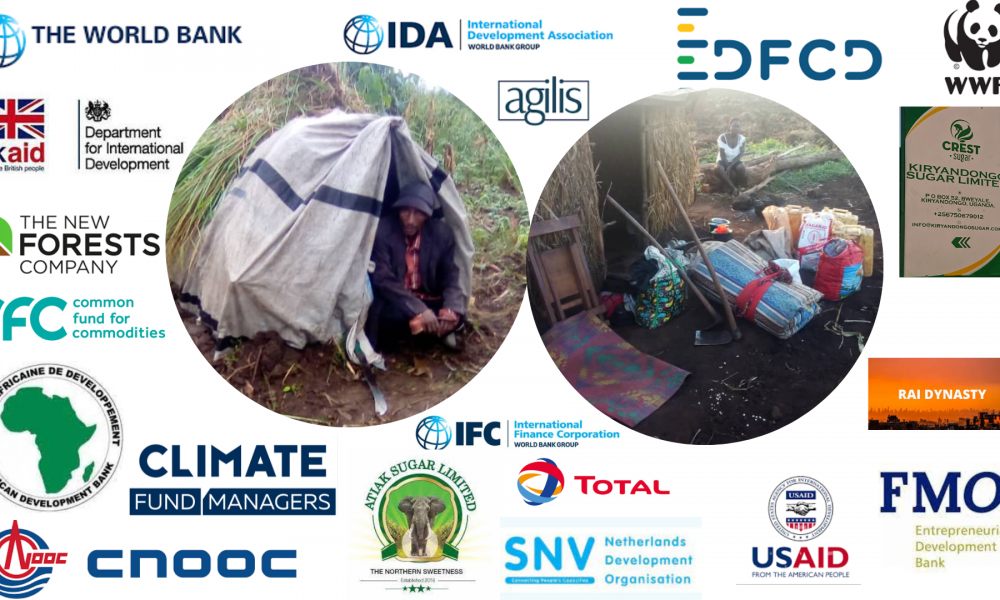SPECIAL REPORTS AND PROJECTS
Impacts of Projects funded by Development Finances: Case series of local landlords in Ugandan that have been reduced to casual laborers.
Published
3 years agoon
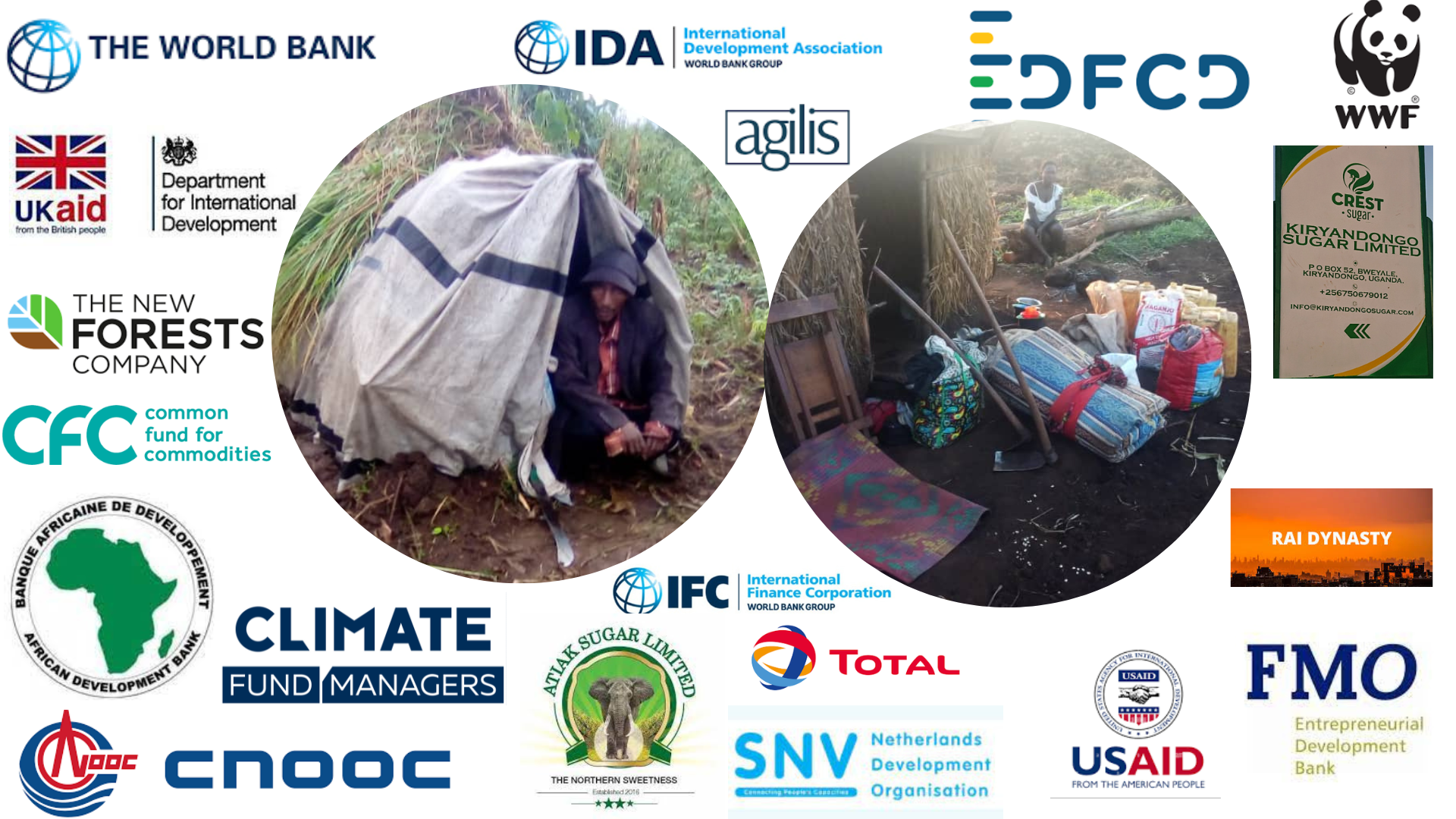
By Witness Radio– Uganda Team
Communities in Uganda whose land is targeted for industrial agriculture, mining, carbon credit tree planting, infrastructural development projects, and others will take decades to understand the ‘true’ meaning of the word “development” due to sufferings associated with forced land acquisition
To them, the development-financed projects mean kidnapping, causing disappearance and torturing of landowners that resist violence from the time of acquiring land for investments, gang raping of women by companies’ workers, and destruction of properties worth millions of dollars among other human rights violations/abuses.
Kikungulu, one of the villages affected by harmful investments in Kiryandongo, a Mid-Western District in Uganda, was once a community of budding smallholder farmers. Gifted with fertile soils, and hospitable culture attributable to its cosmopolitan fabric is no more.
Between 2017 and 2018, Kiryandongo Sugar Limited, a subsidiary of Rai Dynasty based in Kenya, under the guard ship of soldiers cladding Uganda People Defense Forces (UPDF) uniforms, forcefully evicted communities in the Kiryandongo district without prior consultation, compensation, or being offered alternative resettlement.
Tusabe Emmanuel is one of the farmers whose land was forcefully taken by Kiryandongo Sugar limited. He said before losing his land, he would harvest over 12 bags of maize and eight (8) bags of sorghum from his land, which could earn him at least Uganda Shillings over 3.6 million, equivalent to US dollar 1,100 that would cater to the needs of his family.
“I fed my family well, educated my children, and provided basic needs from the proceeds of my harvest” Tusabe, a 25-year-old, reminisced about his past.
Over 15000 smallholder farmers lost their farming land to the company and were left to gamble for life. The company is currently using land that belonged to smallholder farmers to grow sugarcane as raw materials for its sugar factory.
In May 2022, while commissioning the company’s 60 million United States Dollars Kiryandongo Sugar Plant, President Yoweri Museveni urged the evictees to maximize the low-lying benefits associated with a project by seeking employment opportunities.
From a landlord to a laborer: after losing his livelihood, Tusabe sought employment from his evictor Kiryandongo Sugar limited. In an interview with Witness Radio, he sought and got employment, as a casual laborer and paid a daily payment of 3500/= which is equivalent to 0.98 United States Dollars on which shillings 1500 is deducted for his lunch hence remaining with 2000/= that tallies to 60,000/= UGX (15.94 USD) a month.
After a year, he had to quit the job over low payment. He said because there was no other way one could survive without land other than being a slave to the evictor and getting paid peanuts.
“Our dreams were shattered by a company, which took our land for free and claimed was bringing development and employment. This was a myth. We do not have investors instead we have parasites surviving on our resources” he said.
He further revealed that after losing his land, he can not feed his family as all his children have since dropped out of school.
Another case involves New Forests Company (NFC), which plants monoculture forests for carbon credit mitigation. Between 2006 and 2010, more than 10,000 people were forcefully evicted from their lands in the district of Mubende to make way for monoculture tree plantations.
Following the forced eviction of locals from their land, exemplary villages no longer exist. Acreages of banana, coffee, and maize crops, among others, were razed down, and families were brutally evicted by the London-based New Forests Company (NFC).
NFC is currently also benefiting from a new project supported by the Dutch Fund for Climate and Development (DFCD); 160 million euros (more than 185 million dollars) from the Dutch government fund that aims to mobilize private sector finance into carbon projects. The DFCD is managed by investment manager Climate Fund Managers (CFM), NGO Worldwide Fund for Nature Netherlands (WWF-NL), and NGO SNV, and it is led by the Dutch Development Bank, FMO.
In August 2020, DFCD approved a 279,001 euros (around 327,000 dollars) grant and WWF technical assistance package for the New Forests Company (NFC) to develop the final business investment proposal for carbon certification in Uganda for sustainable smallholder growth and timber market diversification. In reality, this would translate into generating carbon finance to support expanding their monoculture plantations and land grabbing.
A 59-year-old Steven Ndyanabo still recounts the misery caused by the eviction. He said on a fateful day, he lost his garden of 35 acres in Kicucula village, houses were destroyed, and livestock was looted. His property was not inherited from his parents but bought them using his hard-earned money.
“I received no compensation after the eviction not even being resettled. My family of 14 lives in poor life. We currently live on my brother’s half-acre land in the Rakai district. My children have nothing to eat, and dropped out of school as the majority of them have been forced into early marriages because of the situation were forced into by an investor.
He added that he was one of the richest people in the area, with plantations of maize, beans, bananas, and coffee that I grew at my farm. He further said, he would earn about 5 million enabling me to live a better life.
Related posts:
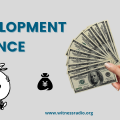
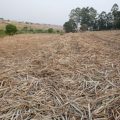 Campaigners lose court case to stop Ugandan forest clearance
Campaigners lose court case to stop Ugandan forest clearance
 Green Resources’ forestry projects are negatively impacting on local communities – donor
Green Resources’ forestry projects are negatively impacting on local communities – donor
 ……Special Report abridged testimony…… How a pregnant woman was beaten by multinationals and local police over her land…
……Special Report abridged testimony…… How a pregnant woman was beaten by multinationals and local police over her land…
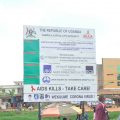 Ugandan communities fighting forced eviction during the COVID-19 pandemic is facing reprisals from the World Bank-funded project implementer, defender arbitrarily arrested
Ugandan communities fighting forced eviction during the COVID-19 pandemic is facing reprisals from the World Bank-funded project implementer, defender arbitrarily arrested
You may like
SPECIAL REPORTS AND PROJECTS
Seizing the Jubilee moment: Cancel the debt to unlock Africa’s clean energy future
Published
4 days agoon
July 12, 2025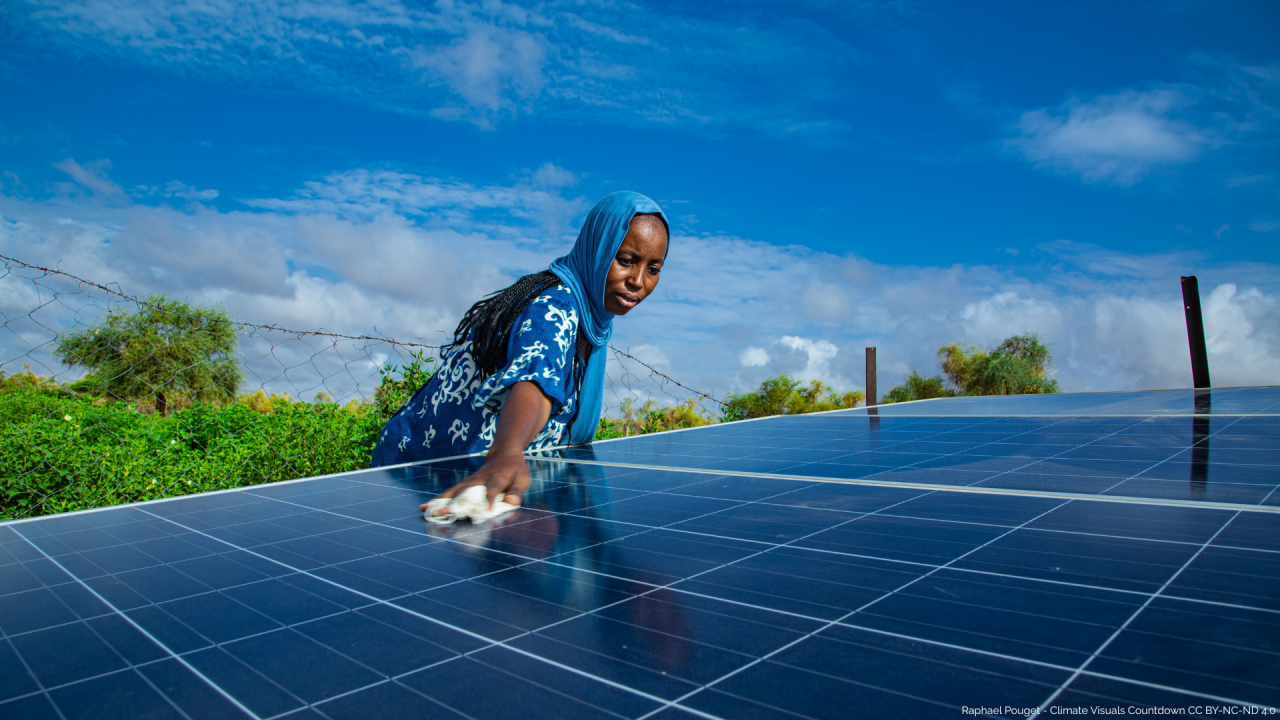
Africa has the resources and the vision for a just energy transition, but it is trapped in a financial system structured to take more than it gives. In this blog, we outline how debt burdens and climate impacts are holding the continent back, and looks at the role of institutions that shape the global financial order, like the World Bank, African Development Bank and IMF. As these institutions and governments meet in Seville for FfD4, we urge them to heed people’s calls for reform: cancel the debt, redistribute the wealth, and fund the just transition. — By Rajneesh Bhuee and Lola Allen
With 60% of the world’s best solar energy resources and 70% of the cobalt essential for electric vehicle batteries, the African continent has everything it needs to power its development and become a global reference point for sustainable energy production. That potential, however, remains largely untapped; Africa receives just 2% of global renewable energy investment. As the UNCTAD Secretary-General Rebeca Grynspan warns, too many countries are forced to “default on their development to avoid defaulting on their debt.”
The cost of servicing unsustainable debts, layered with new loan-based climate and development finance, leaves governments with little fiscal space to invest in clean energy, health or education. In 2022 alone, African countries spent more than $100 billion on debt servicing, over twice what they spent on health or education. Add to this the $90 billion lost annually to illicit financial flows, and the reality is stark: more money leaves the continent through financial leakages (also including unfair trade and extractive investment) than comes in through productive, equitable and development-oriented finance.
These are not isolated problems. They reflect a financial system that has been built to serve global markets rather than people. Between 2020 and 2025, four African countries defaulted on their external debts, that is, they failed to make scheduled repayments to creditors like the International Monetary Fund or bondholders, triggering fiscal crises and, in several cases, IMF interventions tied to austerity measures. Pope Francis’ Jubilee Report (2025) and hundreds of civil society groups argue that these defaults reflect the deeper crisis of unsustainable debt. Meanwhile, 24 more African countries are now in or near debt distress. None have successfully restructured their debts under the G20 Common Framework, a mechanism launched in 2020 to facilitate debt relief among public and private creditors. The Framework has been widely criticised for being slow, opaque and ineffective. According to Eurodad, without urgent systemic reforms, up to 47 Global South countries, home to over 1.1 billion people, face insolvency risks within five years if they attempt to meet climate and development goals.
How debt undermines the just energy transition
Debt has become both a driver and a symptom of climate injustice. Countries that did the least to cause the climate crisis now pay the highest price, twice over. First, they suffer the impacts. Second, they must borrow to rebuild.
This is happening just as concessional finance disappears. The US has withdrawn from the African Development Fund’s concessional window (worth $550m), yet maintains influence over private-sector lending. It has also opted out of the UN Financing for Development Conference (FfD4), a historic opportunity to confront the injustice of our financial system. Meanwhile, European governments, though now celebrating themselves as defenders of multilateralism, played a key role in weakening the outcome of FfD4, slashing aid budgets, redirecting funds toward militarisation, and systematically blocking proposals for a UN-led sovereign debt workout mechanism. With rising insecurity and geopolitical tensions, these actions send a troubling signal: at a moment when global cooperation is urgently needed, many Global North countries are stepping back from efforts to fix the very system that is preventing climate justice and clean energy for much of the Global South.
A role for the AfDB?
The African Development Bank (AfDB), under incoming president Sidi Ould Tah , has made progressive commitments of $10 billion to climate-resilient infrastructure and $4 billion to clean cooking. Between 2022 and 2024, one in five (20%) of its energy dollars were grants, far exceeding The World Bank ‘s 10% and the Asian Development Bank (ADB) ‘s 3.8%. The AfDB has also backed systemic reform: for example, calling for Special Drawing Rights (SDR) redistribution, launching an African Financial Stability Mechanism that could save up to $20 billion in debt servicing, and consistently advocating for fairer lending terms.
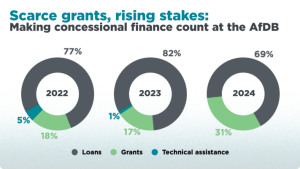
Yet, even progressive leadership struggles within a broken system. Recourse’s recent research shows that AfDB energy finance dropped 67% in 2024, from $992.7 million to just $329.6 million. Of this, a staggering 73% went to large-scale infrastructure like mega hydro dams and export-focused transmission lines, ‘false solutions’ that bypass the energy-poor and displace communities. Meanwhile, support for locally-appropriate, decentralised renewable energy systems such as mini-grids, solar appliances, and clean cookstoves plummeted by over 90%, from $694.5 million to just $61 million, with only five of 13 projects directly addressing energy access in 2024.
Africa received just 2.8% of global climate finance in 2021–22, and what is labelled as “climate finance” is often little more than a Trojan horse: resource-backed loans, debt-for-nature swaps, and blended finance instruments that shift risk to the public while offering little real benefit to local communities. These mechanisms, promoted as “innovative” or “green”, often entrench financial dependency and fail to deliver meaningful change for energy-poor or climate-vulnerable groups.
Meanwhile, initiatives that could build green industry and renewable capacity across Africa are falling short in both scale and speed. Flagship projects, such as the EU’s Global Gateway, have failed to drive green industrialisation in Africa, and carbon markets continue to delay real emissions reductions, subsidise fossil fuel interests, and entrench elite control over land and resources.
Mission 300: Ambition or another missed opportunity?
In this constrained context, the AfDB and World Bank launched Mission 300, an ambitious plan to connect 300 million Africans to electricity by 2030. Pragmatic goals like electrification are crucial, but the story beneath the surface of Mission 300 raises concern. Far from serving households, many projects under the initiative appear more aligned with export markets and large-scale energy users, echoing decades of infrastructure that bypasses those most in need.
Mission 300 can still be transformative, but only if it centres people, not profits. Energy access must begin with those who need it most: women and youth, especially in rural communities. Across Africa, many women cook over open fires, walk hours to gather fuel, and care for families in homes without light or clean air. This is not just an inconvenience, it is structural violence and policy failure.
Yet most energy finance still flows to centralised grids, mega-projects, and sometimes fossil gas (misleadingly called a “transition fuel”). These do little to address energy poverty. Locally appropriate decentralised renewable energy solutions, solar-powered appliances, clean cookstoves, and mini-grids can deliver faster, cheaper, and more equitable impact. Mission 300 must invest in such solutions, without adding to existing debt problems. It should support national policy design, for example, by ensuring that energy policy is responsive to women’s needs, making use of gender-disaggregated data and community consultation.
The Jubilee: A year for action
In a year already marked as a Jubilee moment, African leaders have demanded reform: including a sovereign debt workout mechanism and a UN Tax Convention to end illicit financial flows. Yet as AFRODAD has documented, these demands were blocked at the FfD4 negotiations by wealthy nations—notably the EU and UK—even as climate impacts grow and fiscal space shrinks.
This is not just about finance. It is about reclaiming sovereignty. The incoming AfDB president and all the multilateral development banks face a choice: continue financing extractive, large-scale projects that serve foreign interests, or invest in decentralised, gender-responsive, pro-people solutions that shift power and ownership.
Africa has the resources. What it needs is fiscal space, public-led finance, and global rules that prioritise people and planet over profit. The Jubilee call is clear: cancel the debt, redistribute the wealth, and fund the just transition.
Source: Recourse through LinkedIn Account Recourse.
Related posts:

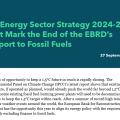 Statement: The Energy Sector Strategy 2024–2028 Must Mark the End of the EBRD’s Support to Fossil Fuels
Statement: The Energy Sector Strategy 2024–2028 Must Mark the End of the EBRD’s Support to Fossil Fuels
 African Development Bank decides not to fund Kenya coal project
African Development Bank decides not to fund Kenya coal project
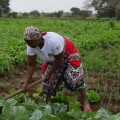 Africa must unlock the power of its women to save climate change
Africa must unlock the power of its women to save climate change
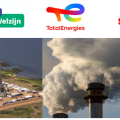 PFZW scraps funding from Total and others for failure to transition into a cleaner energy mix.
PFZW scraps funding from Total and others for failure to transition into a cleaner energy mix.
SPECIAL REPORTS AND PROJECTS
Activism on Trial: Despite the increasing repressive measures, Uganda’s EACOP protesters are achieving unexpected victories in the country’s justice systems.
Published
1 week agoon
July 8, 2025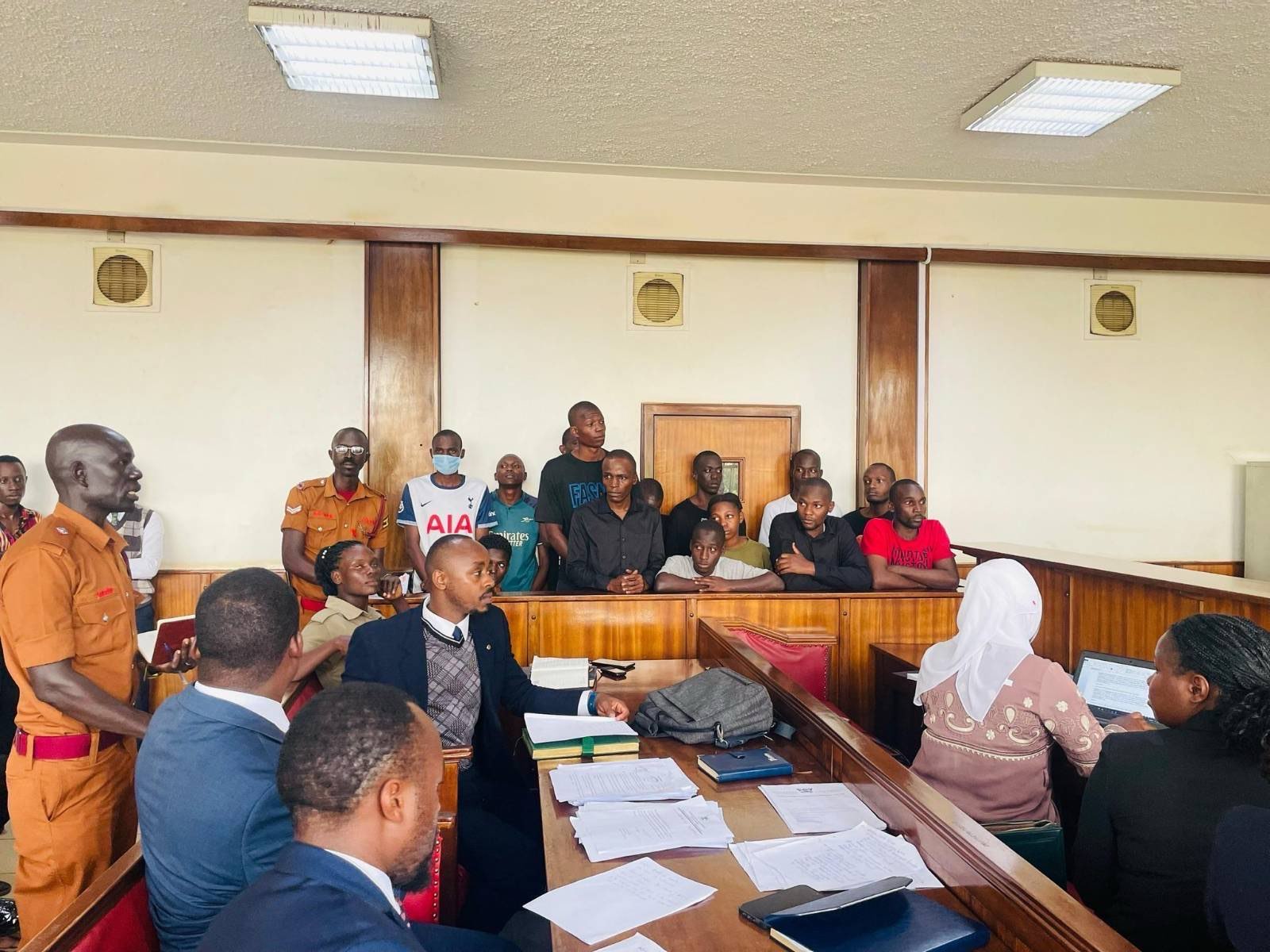
Special report by the dedicated and thorough Witness Radio team, offering a comprehensive and in-depth overview of the situation.
As Uganda moves forward with the controversial East African Crude Oil Pipeline (EACOP), a wave of arrests, intimidation, and court cases has targeted youth and environmental activists opposing the project. However, there is a noticeable and encouraging shift within Uganda’s justice systems, with a growing support for the protesters, potentially signaling a change in the legal landscape.
The EACOP project, stretching 1,443 kilometers from Uganda to Tanzania, has been hailed by the government as a development milestone. However, human rights groups and environmental watchdogs have consistently warned that the project poses serious risks to communities, biodiversity, and the climate. Concerns over land grabbing, inadequate compensation, and ecological degradation have mobilized a new generation of Ugandan activists.
Since 2022, as opposition to EACOP grew louder, Ugandan authorities have intensified a campaign of arrests and legal harassment. Police, military, and currently the Special Forces Command, a security unit tasked with protecting Uganda’s president, have been involved in brutal crackdowns on these activists.
Yuda Kaye, the mobilizer for students against EACOP, believes the criminalization is an attempt by the government to weaken their cause and silence them from speaking out about the project’s negative impacts.
“We are arrested just for raising the project concerns, which affect our future, the local communities, and the environment at large. Oftentimes, we are arrested without reason. They just round us up at once and brutally arrest us, Mr. Kaye reveals, in an interview with Witness Radio’s research team.
Activists have faced a litany of charges, including unlawful assembly, incitement to violence, public nuisance, and criminal trespass. Many of these charges have lacked substantive evidence and have been dismissed by the courts or had their files closed by the police after prolonged delays.
A case review conducted by Witness Radio Uganda reveals that Uganda’s justice system is being used to suppress the activities of youth activists opposing the project, rather than convicting them. However, despite the system being used to silence them, it has often found no merit in these cases.
Of a sample of 20 documented cases since 2022 involving the arrest of over 180 activists, 9 case files against the activists have either been dismissed by courts or closed by the police due to a lack of prosecution, another signal indicating the relevance of their work, while 11 cases remain ongoing.
The chart below shows trends in arrests, dismissed cases, and ongoing cases involving EACOP activists in Uganda from 2022 to May 2025.
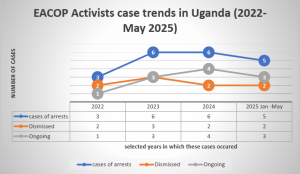
The review was conducted with support from the activists themselves and their lawyers. It involved a desk review and analysis of Witness Radio articles concerning the arrests of defenders and activists opposing the EACOP project.
Witness Radio’s analysis reveals a concerning trend as the majority of cases involving these activists are stalling at the police level rather than progressing to the courts of law. This suggests that the police have not only criminalized activism but are also playing a syndicate role in deliberately prolonging these cases under the excuse of ongoing investigations.
“While both the police and judiciary are being used to suppress dissent, the courts have at least demonstrated a degree of fairness, having dismissed at least 78% of cases that fall within their jurisdiction. In contrast, the police continue to hold 73% of activist cases in limbo, citing investigations as justification for indefinite delays.” The research team discovered.
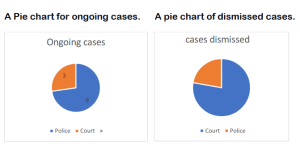
Witness Radio’s analysis further shows that in most of these cases, the state has failed to produce witnesses or evidence to convict the activists, adding that the charges are often just tools of intimidation. Additionally, this is accompanied by more extended periods during which decisions are being made.
Despite the intense crackdown, it is evident that these activists are winning, as no proven record of sentencing has been observed. Instead, these cases are often marred by delays in court or at the police, and in the end, some have been dismissed. This implies that protest marches and petition deliveries serve a purpose; the state just needs to listen to their concerns and formulate possible solutions to address them,” said Tonny Katende, Witness Radio Uganda’s Research, Media and Documentation Officer.
According to Article 29(1)(d) of the Constitution of Uganda, every individual has the right to “assemble and demonstrate together with others peacefully and unarmed and to petition.” Additionally, Article 20 emphasizes that fundamental rights and freedoms “are inherent and not granted by the State.” Yet activists report that police regularly deny them the right to exercise their rights as guaranteed.
At a February 2025 press conference, EACOP activists strongly condemned the police’s continued unlawful arrests of demonstrators exercising their constitutional rights and case delays. This followed escalating crackdowns that added to the tally of over 100 activists arrested in 2024 alone.
“We strongly condemn these arrests. Detaining demonstrators does not address the concerns affecting grassroots communities impacted by oil and gas projects,” declared the group, led by Bob Barigye, who remains in prison on another charge still linked to his opposition to EACOP.
An interview with Mr. Yuda Kaye, a mobilizer from the Students Against EACOP Movement, confirmed that the ongoing dismissals only reaffirm the legitimacy of their resistance.
“These cases are dismissed because the government and its justice systems don’t have any grounds to convict us. This justifies the fact that the issues we’re discussing are real. We only seek accountability, but since the government has power, they criminalize us and silence us,” Mr. Kaye added.
According to Kaye, the intimidation is real, but so is their commitment. “We are called enemies of progress, but we’re only protecting our future and that of our country. We’ve often proposed alternatives, but the government doesn’t want them.” He re-echoes.
Despite this, activists say their rights are routinely violated. Witness Radio Uganda attempted to contact the police spokesperson, Mr. Kituuma Rusooke, but known numbers were unreachable, and messages sent to him went unanswered.
In a separate interview with Mr. James Eremye Mawanda, the Judiciary Spokesperson, he acknowledged the pattern of dismissals and delays.
“As the Judiciary, we listen to cases, and where there is no evidence to support the case, a decision is made. When a crime is allegedly committed and an individual is brought before the court, the courts upholding the rule of law shall administer justice,” he said.
According to Witness Radio’s analysis, 2025 has seen the most dismissals so far, with six cases concluding, reinforcing the view that criminalization is used more for intimidation than as a means of legal redress. “Whereas the arrests took place in separate years, most of the dismissals have happened in 2025,” the research team further highlighted.
Mr. Brighton Aryampa, the team lead of Youth for Green Communities, one of the organizations that provide legal representation for Stop-EACOP activists, highlighted that the criminalization of Ugandan activists undermines Uganda’s democratic principles of free expression and open discourse.
“The government, in bed with oil corporations Total Energies and CNOOC, is deliberating using legal action against Stop EACOP activists to suppress dissent, free speech, right to peaceful protest, and against public participation. This is tainting Uganda as a country that undermines the democratic principles of free expression and open discourse, as hundreds of Stop EACOP activists have been arrested, charged, and some tried by a competent court. However, no one has been found guilty of the fabricated offense usually slapped on them.” He said in an interview with Witness Radio.
Counsel Aryampa further advised that the practice of powerful companies and businesses blackmailing and corrupting the Ugandan government to develop harmful projects while ignoring all social warnings and human rights abuses must be stopped.
The pressure exerted by these activists, both locally and internationally, has slowed the EACOP project. It has also led to bankers and insurers withdrawing from financing or insuring the project. According to Stop EACOP campaigners, more than 40 international banks and 30 global insurance firms, including Chubb, have distanced themselves from the controversial pipeline project, citing human rights and climate concerns raised by these activists.
Meanwhile, as the activism grows, the number of arrests is rising. Within just the first six months of 2025, over 40 activists have been criminalized for their activism. Among them is KCB 11, a group of eleven activists that was arrested at the KCB offices in April 2025. The group has spent over two months on remand, despite their lawyers’ pleas for bail to be granted.
Related posts:

 EACOP activism under Siege: Activists are reportedly criminalized for opposing oil pipeline project in Uganda.
EACOP activism under Siege: Activists are reportedly criminalized for opposing oil pipeline project in Uganda.
 EACOP: The trial of 20 environmental activists failed to take off, and now they want the case dismissed for lack of prosecution.
EACOP: The trial of 20 environmental activists failed to take off, and now they want the case dismissed for lack of prosecution.
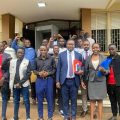 Milestone: Another case against the EACOP activists is dismissed due to the want of prosecution.
Milestone: Another case against the EACOP activists is dismissed due to the want of prosecution.
 The latest: Another group of anti-EACOP activists has been arrested for protesting Stanbic Bank’s financing of the EACOP Project.
The latest: Another group of anti-EACOP activists has been arrested for protesting Stanbic Bank’s financing of the EACOP Project.
SPECIAL REPORTS AND PROJECTS
‘Left to suffer’: Kenyan villagers take on Bamburi Cement over assaults, dog attacks
Published
4 months agoon
March 22, 2025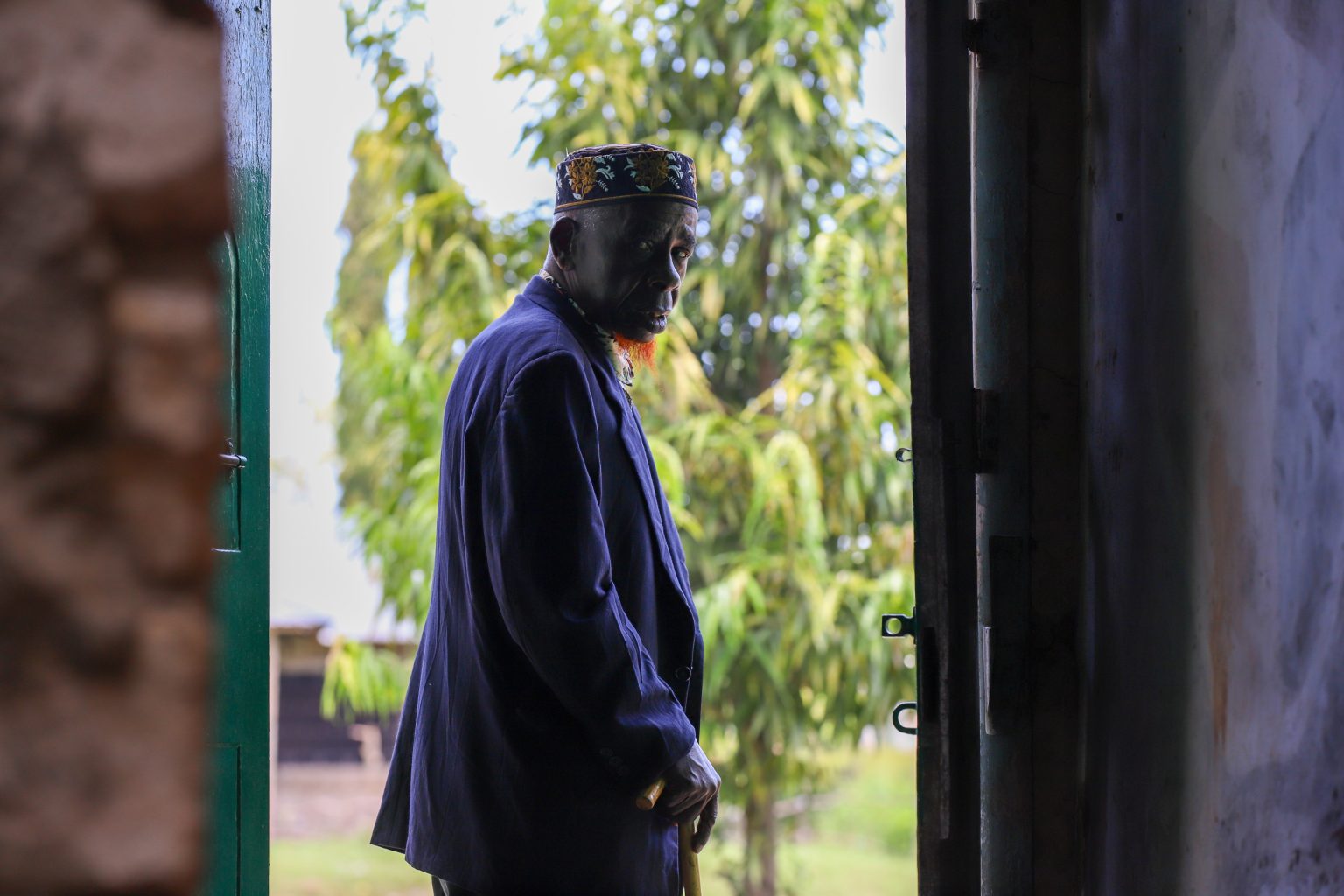
- The victims are aged between 24 and 60, and one of them has since passed on.
- Many were severely injured and hospitalized following brutal attacks, unlawful detention, and physical assault by Bamburi’s security personnel.
Editor’s note: Read the petition here.
Their hopes for justice seemed to be slipping away after initially taking on a multinational corporation and failing to hold it accountable for the brutal injuries they suffered.
The death of one of their own cast a shadow of despair, making it seem unlikely that they would ever bring the corporation to justice for the crimes they alleged.
However, 11 victims of dog attacks, assaults, and other severe human rights violations are now challenging Bamburi Cement PLC’s role in these abuses in court.
They are represented by the Kenya Human Rights Commission (KHRC), which on January 29, 2025, filed a legal claim before a constitutional court in Kenya, seeking to hold the multinational accountable for the harm suffered by the victims—residents of land parcels in Kwale that Bamburi claims ownership of. KHRC worked with the Kwale Mining Alliance (KMA) to bring this case.
The victims, aged between 24 and 60, include Mohamed Salim Mwakongoa, Ali Said, Abdalla Suleiman, Hamadi Jumadari, Abdalla Mohammed, and Omari Mbwana Bahakanda. Others are Shee Said Mbimbi, Omar Mohamed, Omar Ali Kalendi (deceased), Abdalla Jumadari, and Bakari Nuri Kassim.
Bamburi had hired a private security firm and deployed General Service Unit (GSU) officers to guard three adjoining land parcels, covering approximately 1,400 acres in Denyenye, Kwale. The GSU established a camp on the land, which has historically been accessed by residents who have long used established routes to reach the forest and the Indian Ocean.
For decades, these routes provided them with access to resources such as firewood, crops, and fish, which they relied on for their livelihoods. However, five years ago, when they attempted to collect firewood, harvest crops, and access the ocean through the land, Bamburi accused them of trespassing. The company’s private guards and GSU officers responded with force, setting dogs on them and assaulting them.
Many were severely injured and hospitalized following brutal attacks, unlawful detention, and physical assault by Bamburi’s security personnel. These incidents occurred despite the lack of clearly defined boundaries and the fact that the traditional access routes had never been contested.
According to the petition, GSU officers and private guards inflicted serious injuries by kicking, punching, and beating the victims with batons. Those who were arrested were neither taken to a police station nor charged with any offense. Despite their injuries, they were denied emergency medical care.
These actions were intended to intimidate residents, prevent them from accessing the beach, and suppress any historical claims to the land, the victims tell the court. Local police in Kwale failed to investigate the abuses, visit the crime scenes, or arrest any of the perpetrators, they add.
Now, the victims are seeking compensation for these violations. They have also asked the court to declare that their rights were violated through torture inflicted by Bamburi’s guards and GSU officers. Additionally, they want the court to rule that releasing guard dogs to attack them during arrests constituted an extreme and unlawful use of force.
Source: khrc.or.ke
Related posts:

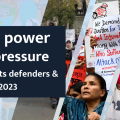 Breaking: Over 600 attacks against defenders have been recorded in the year 2023 globally- BHRRC report.
Breaking: Over 600 attacks against defenders have been recorded in the year 2023 globally- BHRRC report.
 Kaweeri Coffee land grabbing case re-trial resumes as evictees continue to suffer gross human rights violations.
Kaweeri Coffee land grabbing case re-trial resumes as evictees continue to suffer gross human rights violations.
 Criminalization of planet, land, and environmental defenders in Uganda is on the increase as 2023 recorded the soaring number of attacks.
Criminalization of planet, land, and environmental defenders in Uganda is on the increase as 2023 recorded the soaring number of attacks.
 Local land grabbers evict villagers at night; foreign investors cultivate the same lands the next day
Local land grabbers evict villagers at night; foreign investors cultivate the same lands the next day

Land Grabbing Crisis Escalates in Uganda: Mayiga Urges Citizens to Secure Land Documents

Seizing the Jubilee moment: Cancel the debt to unlock Africa’s clean energy future

Activism on Trial: Despite the increasing repressive measures, Uganda’s EACOP protesters are achieving unexpected victories in the country’s justice systems.

Communities Under Siege: New Report Reveals World Bank Failures in Safeguard Compliance and Human Rights Oversight in Tanzania

A decade of displacement: How Uganda’s Oil refinery victims are dying before realizing justice as EACOP secures financial backing to further significant environmental harm.

Activism on Trial: Despite the increasing repressive measures, Uganda’s EACOP protesters are achieving unexpected victories in the country’s justice systems.

Govt launches Central Account for Busuulu to protect tenants from evictions

Communities Under Siege: New Report Reveals World Bank Failures in Safeguard Compliance and Human Rights Oversight in Tanzania

Innovative Finance from Canada projects positive impact on local communities.
Over 5000 Indigenous Communities evicted in Kiryandongo District
Petition To Land Inquiry Commission Over Human Rights In Kiryandongo District
Invisible victims of Uganda Land Grabs
Resource Center
- LAND GRABS AT GUNPOINT REPORT IN KIRYANDONGO DISTRICT
- RESEARCH BRIEF -TOURISM POTENTIAL OF GREATER MASAKA -MARCH 2025
- The Mouila Declaration of the Informal Alliance against the Expansion of Industrial Monocultures
- FORCED LAND EVICTIONS IN UGANDA TRENDS RIGHTS OF DEFENDERS IMPACT AND CALL FOR ACTION
- 12 KEY DEMANDS FROM CSOS TO WORLD LEADERS AT THE OPENING OF COP16 IN SAUDI ARABIA
- PRESENDIANTIAL DIRECTIVE BANNING ALL LAND EVICTIONS IN UGANDA
- FROM LAND GRABBERS TO CARBON COWBOYS A NEW SCRAMBLE FOR COMMUNITY LANDS TAKES OFF
- African Faith Leaders Demand Reparations From The Gates Foundation.
Legal Framework
READ BY CATEGORY
Newsletter
Trending
-

 SPECIAL REPORTS AND PROJECTS1 week ago
SPECIAL REPORTS AND PROJECTS1 week agoActivism on Trial: Despite the increasing repressive measures, Uganda’s EACOP protesters are achieving unexpected victories in the country’s justice systems.
-

 NGO WORK2 weeks ago
NGO WORK2 weeks agoCommunities Under Siege: New Report Reveals World Bank Failures in Safeguard Compliance and Human Rights Oversight in Tanzania
-

 SPECIAL REPORTS AND PROJECTS4 days ago
SPECIAL REPORTS AND PROJECTS4 days agoSeizing the Jubilee moment: Cancel the debt to unlock Africa’s clean energy future
-

 MEDIA FOR CHANGE NETWORK4 days ago
MEDIA FOR CHANGE NETWORK4 days agoLand Grabbing Crisis Escalates in Uganda: Mayiga Urges Citizens to Secure Land Documents

